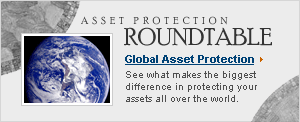FAQ's about Asset Protection?
Answers to some of our most Frequently Asked Questions about Asset Protection
Question: Why Do I need Asset Protection?
Answer: You need to protect your assets because the dynamics of society are uncontrollable. Regardless of how much money you have, or your position at a company or in government there are accidents, litigation over disputes, greedy people, terrorism, scams and litigious crazy attorneys. Even if we did not live in an over litigious society, you would still need asset protection.
Some of the first people to realize that they could be "taken" and needed asset protection were Andrew Carnegie, Henry Ford and John D. Rockefeller. Incidentally, these great businessmen realized that they needed asset protection BEFORE they were millionaires.
Question: Does my risk level determine my need for asset protection?
Answer: No, what determines the need for asset protection is the fact that you have assets. If you value your assets, you need to protect them.
Question: If my assets determine my need, what role does risk play?
Answer: Risk is a determining factor as to what type of protection you may need. There are different ways to protect different assets and different levels of security. This is how a plan works in general.
No longer are professionals and business owners the only high risk group, now the small businessperson (even the common homeowner) must focus on ways to protect their savings, investments and other accumulated assets…anyone with anything of value has become attractive targets for greedy and unscrupulous attorneys.
Question: If the legal system is based on justice, then how is it legal and just for me to protect my assets from others?
Answer: The legal system in the United States is stacked against the defendant (the one against whom the suit is brought) and is in favor of the plaintiff. Think about this, a Judge must give the claim a “green light" to proceed because the plaintiff has brought sufficient cause and reason in the complaint against the defendant. If the Judge feels that the claim has no merit it is dropped. Otherwise the defendant is defending him or herself against a complaint that a Judged as deemed as worthy. This certainly gives the Plaintiff an advantage.
Statistics show that even the average person will be sued one to five times in a lifetime and will face the very real possibility of being on the losing end of a disastrous judgment. Neglecting to plan for that possibility can result in the instantaneous loss of a lifetime's worth of accumulated assets.
Asset protection is legal by stature (laws). There are several reasons for this based on a history of common law. One reason is that others have rights to your assets or they may benefit from the fruits of you assets, such as your wife, your children or your employees. The courts role is to protect the rights of society and not just single individuals. You still have to pay your taxes and conduct your affairs within the limits of the law.
Question: What if I am already in trouble or a lawsuit may be pending?
Answer: We are not lawyers. Although our plans are the best in the world, we must encourage you to speak with a qualified attorney if you are currently involved in or are facing a financial attack. TrustMakers may be able to direct you to a qualified attorney that will work in conjunction with us to help safeguard your interests.
Once a suit seems eminent or has been filed, the law frowns on the technology of protecting or moving assets. NOTE: Although assets may be moved under certain conditions, it is always better to move while the seas are still calm.
The time to protect your assets is when the financial seas are calm and you are within your rights to determine who will control, own and benefit from your estate.
Question: How do lawyers or creditors discover my assets?
Answer: Unless you are protected, this is very easy for them. They hire one of many firms that specialize in locating assets. They can locate bank accounts, brokerage accounts, auto, real estate, businesses, etc., anything in your name. Most of the time a contingency fee attorney will do an asset search on you before he even bothers to sue you. He wants to make sure you have something of value before he spends his time and money.
There is very little about your personal and financial information that cannot be found. However, if the assets are not in your name and are listed in the name of a trustee, finding them becomes much more difficult (if not impossible) and expensive for the plaintiff's lawyer.
TrustMakers does two important things; first we make it virtually impossible for them to gain knowledge of your assets, and even if they discover your assets, they are unreachable.
Question: How can I prevent someone from taking my assets?
Answer: You have taken the first step by visiting our site. The best thing you can do is make yourself a smaller target. Using our technology, we effectively shrink the size of your estate in the eyes of the creditor. You still control and benefit from your assets. As John D. Rockefeller said, "Own nothing and control everything". That is the key. You do not ever need to give up control, but you can give up ownership in such a way that a plaintiff will give up and look for greener pastures.
This is done through a combination of domestic and foreign structures. We will assist you as practitioners in setting up an asset protection plan that is not transparent to a plaintiff attorney and it will NOT result in IRS tax problems.
Question: Are these techniques legal?
Answer: Absolutely, the rich have practiced asset protection for decades. They use these very tools and strategies that we are discussing. They are legal, effective and can give you the peace of mind you have earned. TrustMakers has perfected a process that makes proper asset protection affordable to people.
Question: Can my attorney help me instead of TrustMakers?
Answer: Usually we work with your attorney. Your attorney will consult with us when necessary. Asset protection is not taught as part of the training in law school; it is a specialized area. Consequently, if an attorney is not careful he or she can lose their license if it appears that they assisted a client in hiding assets.
For that reason, the number of attorneys skilled in asset protection is limited. If your particular situation warrants it, we will direct you to qualified attorneys that can help you once you have made the decision to protect yourself.
Question: What is my next step?
Answer: Contact TrustMakers now while you have the time to strategically implement an asset protection plan. An asset protection plan will ensure favorable taxes on the inheritance of your estate, provide adequate insurance and give your legacy the chance to prosper in future generations.

ABOUT THE COMPANY
- About Our Firm
- Trustmakers Sitemap
- Mission Statement
- Panama Comfort Zone
- Asset Protection Newsletters
- Asset Protection Trust
- Family Trust
- Virtual Tour
- Asset Protection Privacy
- Contact Us
- Contributors
- FAQS
- Home Equity Acceleration Plan
- Author News
- Asset Protection Misconceptions
- Asset Protection News
- Asset Protection Trust.02 12 13
- Dynasty Trust The Basics
- Resources
- Asset Protection Affliates
- Asset Protection Facts
- Asset Protection Calm
- Home Protection
- OVERVIEW
- Privacy Policy
- Author Newsletter
- Newsletter
- Asset Protection Trust Services
- Asset Protection Strategy
- Offshore Investing
- Disclaimer
- Rob Lambert
- Panama Canal Zone
- Asset Protection Consultation
- TrustMakers Forms Center
- TrustMakers Site Map

EDUCATION PRODUCTS

Asset Protecion Training
If you are looking for the most important concepts in Asset Protection, this is where to start! If you need to talk intelligently about protecting your net worth or you are a professional this online training program is for you!

Free Asset Protecion Course
Get our Free Online Asset Protection Video Course.
Learn how to protect yourself like the pros!


Asset Protection in a Nutshell
Clear, concise and straight forward, this e-Book will help you make sound decisions with your business and personal assets..

Protecting Assets - 70+ Video Lessons + 3 Ebooks
This e-course will give you straight forward asset protection advice you can implement now. One of the best asset protection courses available! Includes 70+ video lessons, 3 Ebooks, and 6 example legal documents!

Advanced Estate Planner
The key to a solid Asset Protection Plan is the Estate Plan. This downloadable estate organizer will help you keep track of important information about your assets and important legal documents all in one place.
















